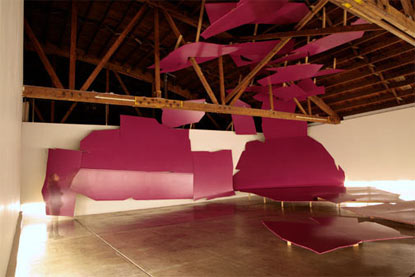
In her expansive installation, Tidal, Jenene Nagy questions the veracity of space and perception. The installation is the latest point along an unbroken line of inquiry for the artist, during the course of which she has evolved a distinctive style: planes of painted surface that begin on the wall but ultimately thrust outward into the viewer’s personal space, thus becoming sculptural. In 2007’s “False Flat” at Linfield College, a jagged, hot-pink painting seemingly escaped the second dimension, jutting out in organic shapes that were supported by wooden beams in the manner of a studio back-lot façade. With its curved forms whipping around like a tail, the piece looked like a minimalist painting that had mutated into a pink dragon. In her installation “s/plit,” for the Portland Art Museum’s APEX series the following year, she continued this strategem, adding neon arrows to the grape-colored components that led the eye across a breach in the structure. More recently, in object-based works for group shows, she has adhered or propped sheets of solid color — often on paper or house paint backed with Magic Tape — against gallery walls, leaving them flush with the wall on one end and loose on the other. In all of these works, and now in “Tidal,” she obsessively tests the fuzzy line between wall art and sculpture in a way that recalls painter Sam Gilliam’s polymorphous experimentations with unstretched canvas.
Tidal begins with the suggestion of a horizon line as a point of orientation. Long rows of fluorescent bulbs, mounted about a foot above the floor, extend down Disjecta’s entryway. Glowing with cold, blue light, like an airplane landing strip at night, the fluorescents lead the viewer deeper into the soaring, cathedral-like main gallery. Rounding the corner into the heart of the space, the viewer is suddenly confronted with a veritable tsunami of magenta-painted drywall sheets, which sweep backward, upward, and overhead in disjointed chunks that nevertheless cohere in the viewer’s perception and “read” as a monster wave. The components have smooth surfaces but rough-hewn edges and are supported underneath, behind, or above by 2x4’s and scaffolding, which the artist makes no effort to conceal. These broad swaths of color are formidable: There are passages 30 feet wide and 15 feet tall. Hovering above the floor, they suggest land masses or water bodies; on the wall, an expansive color-field painting; and dangling from the rafters, breaking seafoam or shards in a mobile of shattered glass.
Like a surge of primal energy, the work commands the space and rivets the viewer’s perception, producing a dizzying effect as the equilibrium struggles to process the churning motion suggested by the forms. The mind interprets the piece as contiguous, though it is clearly not, and struggles to find referents or symbolism, though Nagy, with her support beams brashly unnatural chromatic choices, makes no attempt at painterly or spatial trompe l’oeil. As is her way, she sets up the paradoxes of fracture versus cohesion, two dimensions versus three, then steps away and lets the viewer try to reconcile. Funded by grants from the Regional Arts & Culture Council, Clark College, and the Oregon Arts Commission, Tidal is the artist’s largest and most thematically ambitious statement thus far, insinuating its way from the gallery’s floors all the way up to its rafters and thereby extending her critique of painting and sculpture into the realm of the architectonic.
